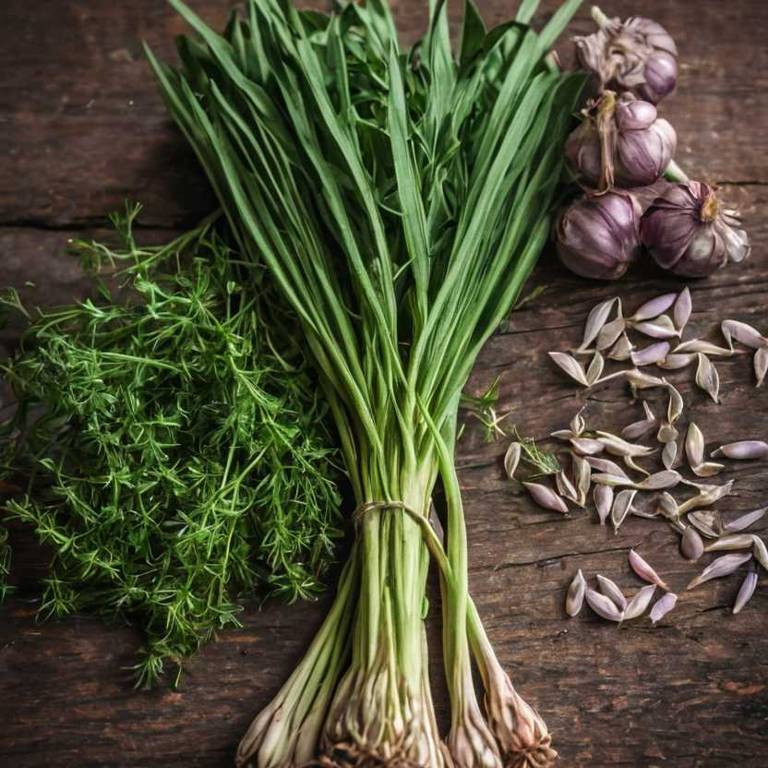By Leen Randell
Updated: Jul 05, 2024
What Are The Medicinal Properties Of Allium Sativum (Garlic)?

Allium sativum, also known as garlic, has health benefits such as lowering cholesterol levels and blood pressure, as well as exhibiting antimicrobial and antiviral properties.
The medicinal constituents of garlic include sulfur compounds, such as allicin and diallyl disulfide, which contribute to its therapeutic effects. Garlic is prepared as a supplement in capsule or tablet form, as well as being used as a flavoring agent in cooking. Possible side effects of garlic include digestive issues, such as bloating and gas, particularly when consumed in high doses.
Precautions to take when using garlic include consulting a healthcare professional, especially for individuals with bleeding disorders or taking anticoagulant medications.
This article explains the health benefits, active constituents, medicinal preparations, possible side effects, and precautions related to Allium sativum.
What are the health benefits of Allium sativum?
Allium sativum, also known as garlic, has health benefits such as lowering cholesterol levels, reducing blood pressure, and fighting off bacterial and viral infections.
Its antimicrobial properties help to prevent illness and promote overall well-being.
Regular consumption of garlic has also been linked to improved cardiovascular health and a reduced risk of certain cancers, making it a valuable addition to a healthy diet.
Here's a detailed article about the 10 health benefits of Allium sativum.
What are the active constituents of Allium sativum?
Allium sativum, also known as garlic, has active constituents such as allicin, a sulfur-containing compound with antimicrobial properties.
Allicin is responsible for the characteristic smell and flavour of garlic, and is also thought to contribute to its medicinal effects.
Other constituents, including diallyl disulfide and gamma-glutamyl-S-allyl-cysteine sulfoxide, have been identified as contributing to garlic's potential health benefits.
Here's a detailed article about the 10 active constituents of Allium sativum.
What are the medicinal preparations of Allium sativum?
Allium sativum, also known as garlic, has medicinal preparations such as capsules, tablets, and oil.
The bulb is crushed or extracted to create various forms. Allicin, a key compound, is responsible for its antimicrobial properties.
Preparations may be combined with other herbs to enhance their effects. Garlic oil, often used topically, is extracted from the bulb.
Capsules and tablets are used to treat various ailments, including cardiovascular issues.
Here's a detailed article about the 10 medicinal preparations of Allium sativum.
What are the possible side effect of using Allium sativum improperly?
Improper use of Allium sativum, also known as garlic, increases the chances of experiencing side effects such as bloating, gas, and indigestion.
High doses of garlic can also lead to heartburn, diarrhea, and nausea in some individuals. Additionally, garlic can interact with certain medications, including blood thinners and diabetes medications, potentially leading to serious health complications.
Moderation is key when consuming garlic to minimize the risk of side effects.
Here's a detailed article about the 10 most common side effects of Allium sativum.
What precautions to take when using Allium sativum medicinally?
Before using Allium sativum, also known as garlic, for medicinal purposes, you must take precautions such as consulting with a healthcare professional, particularly if you have allergies or take medications.
Pregnant or breastfeeding women should use it under medical guidance. Garlic can interact with blood thinners, diabetes medications, and certain antibiotics, so inform your healthcare provider of its use.
Also, be cautious of potential allergic reactions, such as skin irritation or digestive issues.
Here's a detailed article about 10 precautions to take when using Allium sativum.